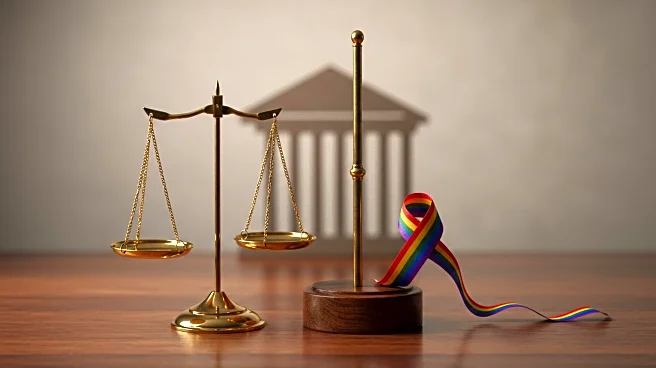What's Happening?
A recent appeal by former Kentucky clerk Kim Davis to the Supreme Court has sparked discussions about the potential overturning of the 2015 Obergefell v. Hodges decision, which legalized same-sex marriage. Davis, who refused to issue marriage licenses to same-sex couples citing her religious beliefs, is seeking to overturn a $100,000 damages award against her. Her appeal includes a request to overturn Obergefell, although legal experts consider it unlikely that the Supreme Court will take up the case. The appeal primarily focuses on whether state officials can use religious liberty as a defense against discrimination claims. The Supreme Court receives thousands of petitions annually and grants only a small fraction, making it improbable that Davis' case will be heard.
Why It's Important?
The appeal highlights ongoing tensions between religious liberty claims and LGBTQ+ rights. While the Supreme Court is not expected to overturn marriage equality, the case underscores the broader legal strategies being employed to challenge LGBTQ+ rights under the guise of religious freedom. The conservative supermajority on the court has previously ruled in favor of religious liberty in cases involving LGBTQ+ discrimination, raising concerns about the potential erosion of rights. The case also reflects the political and social dynamics surrounding LGBTQ+ rights in the U.S., with some justices signaling reluctance to revisit marriage equality, despite broader conservative agendas.
What's Next?
If the Supreme Court decides not to hear Davis' appeal, the lower court's ruling will stand, reinforcing the legal precedent that state officials cannot use religious beliefs to justify discrimination. However, the broader implications for LGBTQ+ rights remain uncertain, as the court continues to address related issues. Future cases may further test the balance between religious liberty and anti-discrimination protections, potentially influencing public policy and societal norms.
Beyond the Headlines
The case reflects a strategic shift among conservative groups, focusing on religious liberty as a means to challenge LGBTQ+ rights without directly overturning established precedents like Obergefell. This approach could lead to incremental changes in the legal landscape, affecting the daily lives of LGBTQ+ individuals and their access to equal rights and protections.









